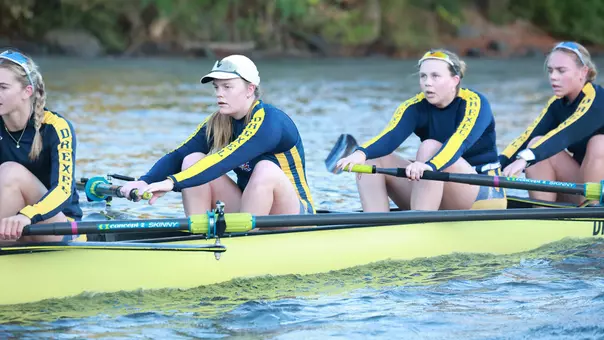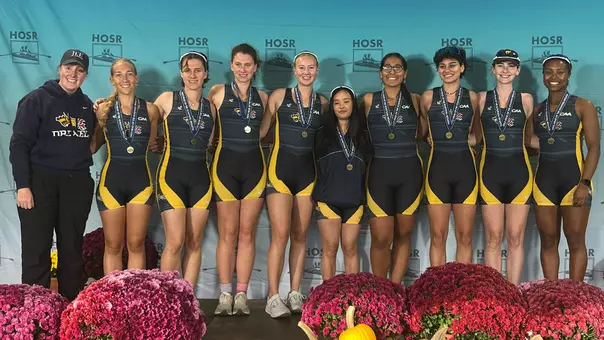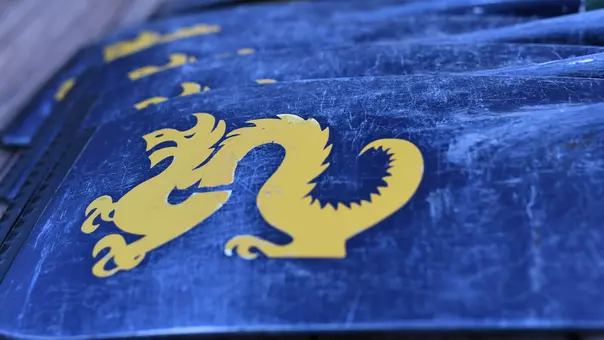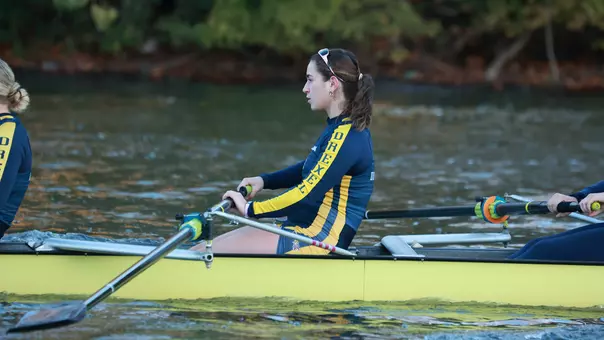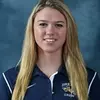Drexel University Athletics
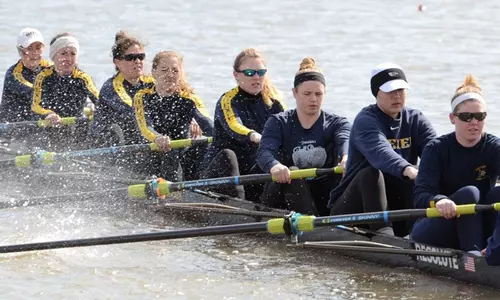
Meghan Knecht, 5-seat, at the Murphy Cup
Photo by: Mark DiLucca
Crew's Meghan Knecht, the Knecht Cup and Learning Her Family's Past
4/9/2015 1:42:00 PM | Women's Rowing
By: Kevin Rossi
PHILADELPHIA – The Knecht Cup is annually circled on the schedules of collegiate rowers across the country as one of the events that demands peak preparation, focus and performance.
Some of the nation's top crews see the Knecht Cup as an opportunity to see how they stack up against the best, heading into a brutal and trying homestretch that culminates in nationals.
For one Drexel rower, though, the Knecht Cup means connecting with family tradition. For her it means keeping the Knecht name alive in the rowing community. For Meghan Knecht, the Knecht Cup means rowing in the event named for her grandfather, Bill Knecht, a gold medal winner for the United States at the 1964 Tokyo Olympic Games.
--
Bill Knecht's path to the Vesper Boat Club's gold winning eight makes perfect sense for the boat because it didn't naturally make much sense at all.
Knecht was a 34-year-old rowing junkie with six kids (at the time), working in the sheet metal industry. Sure, he rowed the double in the 1960 Rome Olympic Games with Philadelphia legend Jack Kelly and had experience rowing to victory at a number of national and international events. But that was four years prior, a long time in rowing years.
It seems to be an unlikely grouping because it was. There were brothers, Joseph and Thomas Amlong. There were recent Ivy Leaguers Boyce Budd, Emory Clark and Bill Stowe. There was Robert Zmonyi, who was from Hungary. There were military men and college students. There was Knecht raising a family with a successful career.
"We were a bunch of misfits assembled by Jack Kelly" said Clark, who wrote a memoir published last year, Olympic Odyssey, about the experience. "It wasn't like a Drexel crew or a Yale crew or a St. Joe's crew where everyone came from the same background and had the same motives."
The misfits were pieced together by Kelly, and the boat's coach, Al Rosenberg. They rowed out of Vesper, training on the Schuylkill River, just as crews of today do.
Their path to the gold was perhaps just as unlikely the original grouping. The crew surprised a powerhouse Harvard crew at Travers Island, N.Y. in Olympic trials to earn the spot as the U.S. representative in Tokyo. While in Tokyo, the Vesper boat fell to West Germany, largely considered the best crew at the Games, by only .028 in the opening heat. They would qualify for the finals on the Toda Rowing Course in the next set of heats.
In the final, Vesper won the gold, comfortably outlasting West Germany and the Soviet Union after overcoming an early German lead. And it was something that Knecht said to Clark before the race that has stuck with him as a lasting moment through the 50-plus years since.
"One of the things I recall was we rowed the final race in the dark in Tokyo because they had bad weather and they delayed the races," Clark said. "They shot up flares to light the finish, which was kind of surreal.
"I'm standing there, people are milling around and there's Bill. He looks at me and he says, 'Emory, we're gonna send each other Christmas cards every year and sign them 'From one gold to another.'' And we did."
That's the kind of leader Knecht was, highlighted by a quiet confidence and leading by example.
"He was a quiet guy who did his job and did it well," Clark said. "He'd raced so much all around the world that he'd just put his oar and pull each time."
"He was a very, very smooth oarsman," Clark added. "He rowed in the 7-seat and I rowed in the 5-seat, so I watched his oar on every stroke. He had a very smooth stroke and quick hands out of the bow, and I was always late but always tried to match him. It was a privilege to row behind him."
Knecht was a member of the National Rowing Hall of Fame, member of the Olympic Rowing Team Committee, judge at the 1992 Barcelona Olympics and the founder of the Cooper River Rowing Association. Knecht graduated from Villanova University in 1951 after attending La Salle High School. Villanova hosts the annual Knecht Cup Regatta in his name, which was traditionally held on the Cooper River until last season.
--
The passion for rowing is apparently one of those traits that skips a generation. Meghan Knecht's father, Scott, gravitated away from the water and to the basketball court. Her older sister rowed, but almost scared the younger Meghan away from the sport.
"I just remember thinking that I would never do that because she was up so early, it was always so cold and she always talked about how 'I don't know why anyone would row,'" Knecht said. "And I went to high school and just kind of decided to try it out in the spring of my freshman year, and I immediately knew that I wanted to do it."
Although her father didn't row, there was still something about the sport that brought his father, Bill, so much success. Rowing was the only sport Meghan could quit hoops for.
She was hooked. Now she's consistently rowing for Drexel's second varsity eight as a freshman.
Knecht fought hard to get to Drexel's second eight. Two herniated disks kept her out of competition during the fall season, but she battled through the immediate adversity, going through physical therapy, meeting with trainers and doing her own workouts to stay in rowing shape.
"She put in good work in the winter," Drexel director of rowing Paul Savell said. "Meghan pretty quickly jumped into the top 15, then right into the top 8 on the erg."
"We have four freshmen in the top two eights for the first time in a while," assistant coach Denise Ferrero said. "Three have been there all year, but Meghan worked her way into the mix pretty quickly."
And as the Dragons' coaching staff describes, it sounds like Knecht has taken a page out of her grandfather's playbook.
"She's a driven person," Savell said. "She's competitive, tenacious. You have to have a fire in you to be able to compete like that. You're not going to get to the level that she has this fast without it."
On Saturday, Knecht will be the first in her immediate family to row in the regatta that brandishes the family name.
For Knecht, the experiences of rowing for Drexel on the Schuylkill out of the Bachelor's Barge Club on Boathouse Row and now competing in the Knecht Cup have given her the unique opportunity to get to know her grandfather, even though he passed before she was born.
"Every time I'm over by the Schuylkill there's somebody who knew him or rowed with him, my roommate's dad rowed with him," Knecht said. "It's kind of cool hearing all these different stories from people who knew him because he passed away before I was born. I knew nothing about him until I got into rowing, so that's something that's really interesting to me because I'd never really heard any stories.
"Now, I feel like I did know him."
On top of it all, she recently read Clark's book about the Vesper eight that her grandfather helped to gold in Tokyo in 1964, taking from it lessons she will carry with her.
"It's fresh in my mind, and for me it's a motivational thing," she said. "I love hearing stories about how it's on the Schuylkill, how they were doing the same course we're doing now. They were doing 500s, we're doing 500s right there, too. It gets me through a lot of the workouts.
"There's a picture in the book of them on the Vesper dock with the Art Museum in the background, and that's a picture that I took with my roommates in September. It's cool to see the similarities and what he left on the Schuylkill that I feel like I'm picking up."
PHILADELPHIA – The Knecht Cup is annually circled on the schedules of collegiate rowers across the country as one of the events that demands peak preparation, focus and performance.
Some of the nation's top crews see the Knecht Cup as an opportunity to see how they stack up against the best, heading into a brutal and trying homestretch that culminates in nationals.
For one Drexel rower, though, the Knecht Cup means connecting with family tradition. For her it means keeping the Knecht name alive in the rowing community. For Meghan Knecht, the Knecht Cup means rowing in the event named for her grandfather, Bill Knecht, a gold medal winner for the United States at the 1964 Tokyo Olympic Games.
--
Bill Knecht's path to the Vesper Boat Club's gold winning eight makes perfect sense for the boat because it didn't naturally make much sense at all.
Knecht was a 34-year-old rowing junkie with six kids (at the time), working in the sheet metal industry. Sure, he rowed the double in the 1960 Rome Olympic Games with Philadelphia legend Jack Kelly and had experience rowing to victory at a number of national and international events. But that was four years prior, a long time in rowing years.
It seems to be an unlikely grouping because it was. There were brothers, Joseph and Thomas Amlong. There were recent Ivy Leaguers Boyce Budd, Emory Clark and Bill Stowe. There was Robert Zmonyi, who was from Hungary. There were military men and college students. There was Knecht raising a family with a successful career.
"We were a bunch of misfits assembled by Jack Kelly" said Clark, who wrote a memoir published last year, Olympic Odyssey, about the experience. "It wasn't like a Drexel crew or a Yale crew or a St. Joe's crew where everyone came from the same background and had the same motives."
The misfits were pieced together by Kelly, and the boat's coach, Al Rosenberg. They rowed out of Vesper, training on the Schuylkill River, just as crews of today do.
Their path to the gold was perhaps just as unlikely the original grouping. The crew surprised a powerhouse Harvard crew at Travers Island, N.Y. in Olympic trials to earn the spot as the U.S. representative in Tokyo. While in Tokyo, the Vesper boat fell to West Germany, largely considered the best crew at the Games, by only .028 in the opening heat. They would qualify for the finals on the Toda Rowing Course in the next set of heats.
In the final, Vesper won the gold, comfortably outlasting West Germany and the Soviet Union after overcoming an early German lead. And it was something that Knecht said to Clark before the race that has stuck with him as a lasting moment through the 50-plus years since.
"One of the things I recall was we rowed the final race in the dark in Tokyo because they had bad weather and they delayed the races," Clark said. "They shot up flares to light the finish, which was kind of surreal.
"I'm standing there, people are milling around and there's Bill. He looks at me and he says, 'Emory, we're gonna send each other Christmas cards every year and sign them 'From one gold to another.'' And we did."
That's the kind of leader Knecht was, highlighted by a quiet confidence and leading by example.
"He was a quiet guy who did his job and did it well," Clark said. "He'd raced so much all around the world that he'd just put his oar and pull each time."
"He was a very, very smooth oarsman," Clark added. "He rowed in the 7-seat and I rowed in the 5-seat, so I watched his oar on every stroke. He had a very smooth stroke and quick hands out of the bow, and I was always late but always tried to match him. It was a privilege to row behind him."
Knecht was a member of the National Rowing Hall of Fame, member of the Olympic Rowing Team Committee, judge at the 1992 Barcelona Olympics and the founder of the Cooper River Rowing Association. Knecht graduated from Villanova University in 1951 after attending La Salle High School. Villanova hosts the annual Knecht Cup Regatta in his name, which was traditionally held on the Cooper River until last season.
--
The passion for rowing is apparently one of those traits that skips a generation. Meghan Knecht's father, Scott, gravitated away from the water and to the basketball court. Her older sister rowed, but almost scared the younger Meghan away from the sport.
"I just remember thinking that I would never do that because she was up so early, it was always so cold and she always talked about how 'I don't know why anyone would row,'" Knecht said. "And I went to high school and just kind of decided to try it out in the spring of my freshman year, and I immediately knew that I wanted to do it."
Although her father didn't row, there was still something about the sport that brought his father, Bill, so much success. Rowing was the only sport Meghan could quit hoops for.
She was hooked. Now she's consistently rowing for Drexel's second varsity eight as a freshman.
Knecht fought hard to get to Drexel's second eight. Two herniated disks kept her out of competition during the fall season, but she battled through the immediate adversity, going through physical therapy, meeting with trainers and doing her own workouts to stay in rowing shape.
"She put in good work in the winter," Drexel director of rowing Paul Savell said. "Meghan pretty quickly jumped into the top 15, then right into the top 8 on the erg."
"We have four freshmen in the top two eights for the first time in a while," assistant coach Denise Ferrero said. "Three have been there all year, but Meghan worked her way into the mix pretty quickly."
And as the Dragons' coaching staff describes, it sounds like Knecht has taken a page out of her grandfather's playbook.
"She's a driven person," Savell said. "She's competitive, tenacious. You have to have a fire in you to be able to compete like that. You're not going to get to the level that she has this fast without it."
On Saturday, Knecht will be the first in her immediate family to row in the regatta that brandishes the family name.
For Knecht, the experiences of rowing for Drexel on the Schuylkill out of the Bachelor's Barge Club on Boathouse Row and now competing in the Knecht Cup have given her the unique opportunity to get to know her grandfather, even though he passed before she was born.
"Every time I'm over by the Schuylkill there's somebody who knew him or rowed with him, my roommate's dad rowed with him," Knecht said. "It's kind of cool hearing all these different stories from people who knew him because he passed away before I was born. I knew nothing about him until I got into rowing, so that's something that's really interesting to me because I'd never really heard any stories.
"Now, I feel like I did know him."
On top of it all, she recently read Clark's book about the Vesper eight that her grandfather helped to gold in Tokyo in 1964, taking from it lessons she will carry with her.
"It's fresh in my mind, and for me it's a motivational thing," she said. "I love hearing stories about how it's on the Schuylkill, how they were doing the same course we're doing now. They were doing 500s, we're doing 500s right there, too. It gets me through a lot of the workouts.
"There's a picture in the book of them on the Vesper dock with the Art Museum in the background, and that's a picture that I took with my roommates in September. It's cool to see the similarities and what he left on the Schuylkill that I feel like I'm picking up."
Players Mentioned
Drexel's Autocomplete With Rowing Coach Paul Savell
Tuesday, March 18
Justin Best - Olympic Gold Medal Rower
Wednesday, March 05
Dragon Leadership Academy Feature 2024
Friday, March 01
Game Plans - Presented by The Study - Rowing Coach Katie Lane
Tuesday, February 06











